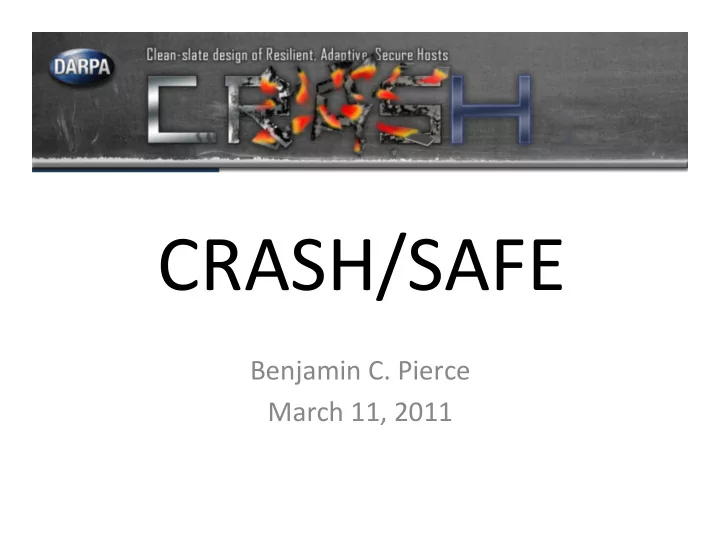

CRASH/SAFE ¡ Benjamin ¡C. ¡Pierce ¡ March ¡11, ¡2011 ¡
Present-‑day ¡compuCng ¡plaForms ¡ ¡ are ¡distressingly ¡insecure! ¡
One ¡culprit: ¡legacy ¡requirements ¡ complex ¡instrucCon ¡sets ¡ complex, ¡monolithic ¡operaCng ¡systems ¡ insecure, ¡low-‑level ¡programming ¡languages ¡ Patch? ¡ Reboot! ¡
CRASH ¡ Clean-‑Slate ¡Design ¡ ¡ of ¡Resilient, ¡AdapCve, ¡Secure ¡Hosts ¡
SAFE ¡Team ¡ Consul-ng ¡ André ¡DeHon ¡ Tom ¡Knight ¡ Bryan ¡Loyall ¡ Greg ¡Sullivan ¡ University ¡of ¡Pennsylvania ¡ Northeastern ¡ BAE ¡Systems ¡ Howard ¡Reubenstein ¡ Benjamin ¡Pierce ¡ Olin ¡Shivers ¡ Basil ¡Krikeles ¡ Harvard ¡ Jothy ¡Rosenberg ¡ Jonathan ¡Smith ¡ Greg ¡Morrise[ ¡ Greg ¡Frazier ¡ Also: ¡Ben ¡Karel, ¡Benoit ¡ Also: ¡Tim ¡Anderson, ¡Chris ¡White, ¡… ¡ Also: ¡Gregory ¡Malecha ¡ Montagu ¡ 5 ¡
Core ¡Principles ¡ ● Fine-grained compartmentalization: supported by hardware, with runtime intents & security interlocks, without compromising performance ● Tagged data for compartmentalization and intent ● Programmable Rulesets ● Hardware Tag Management Unit for complete mediation on cycle-by- cycle basis. Checking performed in parallel to mainline for high performance. ● Radical Co-design for pervasive verification: define clean semantics and omit complicating features to make verification tractable ● Prevention-in-Depth: radical decomposition of systems into mutually suspicious components with separated privileges.
Topic ¡Areas ¡ 1. Tagged ¡Processor ¡Architectures ¡ 2. “Zero-‑Kernel” ¡OperaCng ¡Systems ¡ 1. Strong ¡compartmentalizaCon ¡ 2. Mutual ¡suspicion ¡ 3. Programming ¡Languages ¡ 1. Tempest ¡– ¡low-‑level ¡systems ¡programming ¡(C-‑like) ¡ 2. Breeze ¡– ¡high-‑level ¡applicaCons ¡programming ¡(ML/ Haskell-‑like) ¡ ¡ 4. System-‑wide ¡applicaCon ¡of ¡Formal ¡Methods ¡ 1. Design ¡for ¡verifiability ¡
HARDWARE ¡
• Process ¡tags ¡in ¡parallel ¡with ¡ datapath ¡ – No ¡impact ¡on ¡cycle ¡Cme ¡ • Leverage ¡exisCng ¡ speculaCon/in-‑order ¡ excepCon ¡and ¡reCrement ¡ hardware ¡ • Implement ¡with ¡fast, ¡small ¡ Tag ¡Management ¡Unit ¡ – Similar ¡in ¡size/complexity ¡to ¡ TLB ¡ 11/2/2010 ¡ CRASH ¡SAFE ¡ 10 ¡
A ¡taste ¡of ¡ µ Breeze ¡
µ Breeze ¡overview ¡ • Straw-‑man ¡design ¡– ¡just ¡to ¡gain ¡experience ¡ • An ¡untyped, ¡CBV ¡lambda-‑calculus ¡with ¡ – informaCon-‑flow ¡tracking ¡ a ¡la ¡JIF/JFlow ¡ • every ¡value ¡is ¡tagged ¡with ¡a ¡ label ¡specifying ¡who ¡may ¡ read ¡(eliminate) ¡it ¡ – communicaCon ¡channels ¡(elided ¡for ¡today) ¡and ¡ threads ¡(soon) ¡
Syntax ¡
EvaluaCon ¡ current ¡PC ¡label ¡ current ¡environment ¡ (binding ¡variables ¡to ¡ result ¡ current ¡authority ¡ their ¡values) ¡ (atom ¡= ¡value+label) ¡ current ¡store ¡ new ¡store ¡ expression ¡being ¡evaluated ¡
Labels ¡ confiden+ality ¡part ¡ integrity ¡part ¡ [E: ¡{Benjamin: ¡Simon, ¡Steve}, ¡I: ¡…] ¡ ¡ owner ¡ readers ¡
Labels ¡ Decentralized ¡Label ¡Model ¡ (Liskov/Myers) ¡ MulCple ¡owners, ¡ each ¡asserCng ¡a ¡constraint ¡on ¡who ¡may ¡read ¡ owner ¡ readers ¡ [E: ¡{Benjamin: ¡Simon, ¡Steve; ¡ ¡ ¡ ¡ ¡ ¡ ¡ ¡Stephanie: ¡Simon, ¡John, ¡Mary}, ¡I: ¡…] ¡ ¡ owner ¡ readers ¡
Authority ¡
Values ¡and ¡Atoms ¡
EvaluaCon ¡
EvaluaCon ¡
Example ¡ val bool = � auth BOOL in � let label private = � [ E: BOOL:BOOL | * & I: * : {} ] in � let label public = � [ E: * : * & I: * : {} ] in � { true = (\t f. t) \/ private � ; false = (\t f. f) \/ private � ; ifthen = (\b t f. � let label L = � [ E: BOOL : * | {} & I: * : * ] � in (b t f) /\ L) � \/ public � } \/ public � � �
Recommend
More recommend